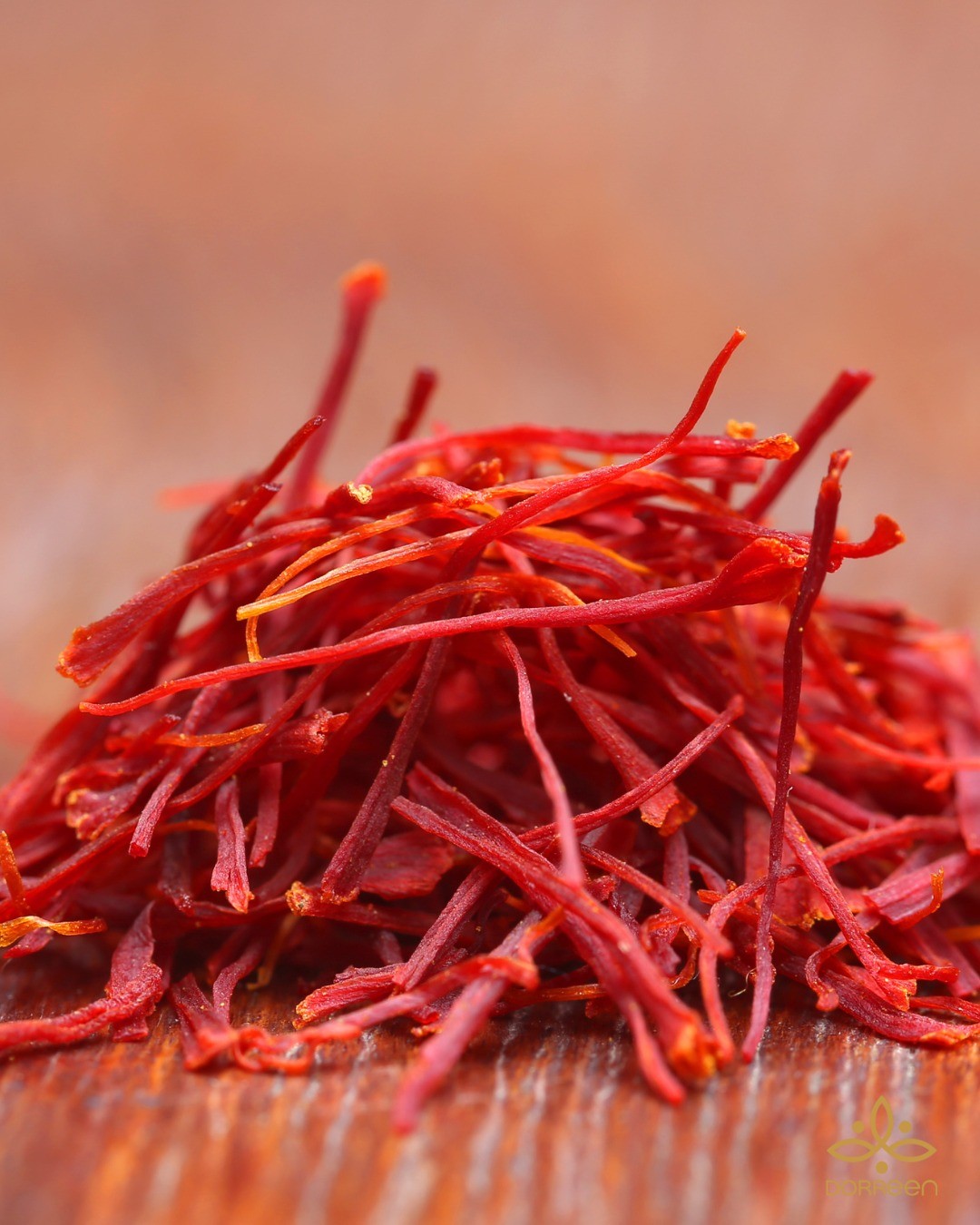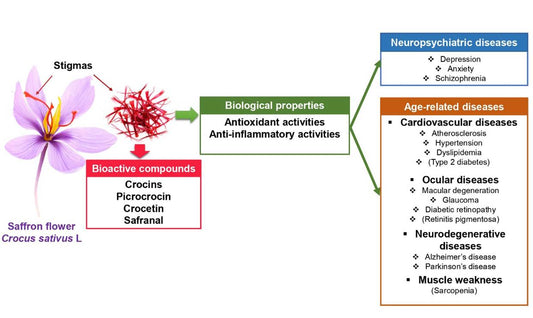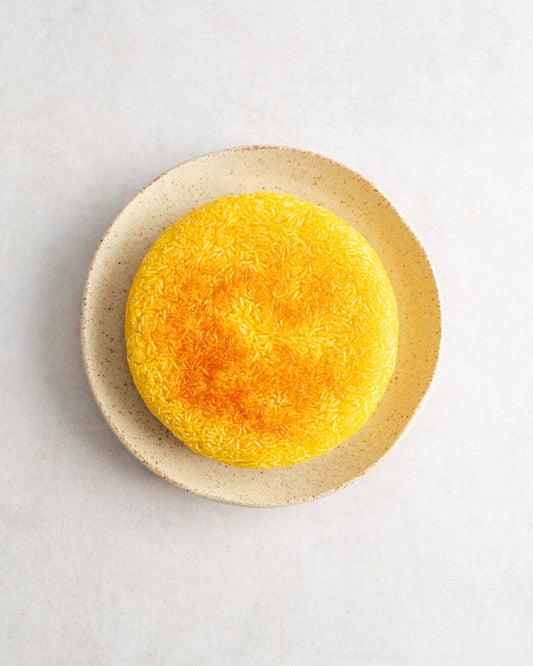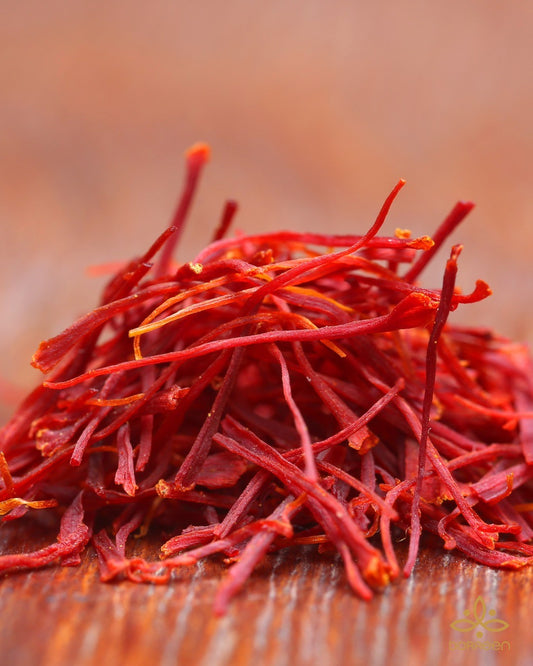
Introduction to Saffron’s Health Benefits
Share
Key Points
Research suggests saffron offers benefits for mental health, including reducing depression and anxiety symptoms, with studies showing 30 mg/day can match antidepressants like fluoxetine.
It seems likely that saffron supports heart health by lowering blood pressure and improving cholesterol levels, with evidence from clinical trials.
The evidence leans toward saffron aiding eye health, particularly for age-related macular degeneration, with 20 mg/day improving visual function in some studies.
An unexpected detail is saffron’s potential to enhance sleep quality, especially in type 2 diabetes patients, by increasing non-rapid-eye-movement sleep.
Introduction to Saffron’s Health Benefits
Saffron, derived from the Crocus sativus flower, is renowned for its vibrant color and flavor, but it’s also a powerhouse of health benefits backed by science. Studies show it can help with mental health issues like depression, support heart health by managing blood pressure, and even improve eye conditions like macular degeneration. Let’s explore how saffron can be a natural ally for your well-being.
Mental Health Support
Research suggests saffron can reduce symptoms of mild to moderate depression, with a 6-week study showing 30 mg/day was as effective as 20 mg/day of fluoxetine (Crocus sativus L. in depression treatment). It may also ease anxiety and improve schizophrenia symptoms, making it a promising natural option for mental health.
Heart and Metabolic Health
It seems likely that saffron can lower blood pressure and improve cholesterol levels, with trials showing benefits for heart health (Anti-hyperglycemic effects of saffron). For diabetes, it may reduce blood sugar and enhance insulin sensitivity, offering metabolic support.
Eye and Brain Health
The evidence leans toward saffron helping with eye conditions, like age-related macular degeneration, where 20 mg/day improved visual function in a 14-month study (Saffron in macular degeneration). It also shows promise for Alzheimer’s, potentially delaying cognitive decline.
Sleep and Other Benefits
An unexpected detail is saffron’s ability to improve sleep, particularly in type 2 diabetes patients, by enhancing non-rapid-eye-movement sleep (Effects of saffron on sleep quality). It may also boost muscle strength and sexual function, adding to its wide-ranging benefits.
Survey Note: The Science-Backed Benefits of Saffron: A Comprehensive Guide
As of March 23, 2025, saffron (Crocus sativus L.) stands out as a spice with significant health benefits, supported by a growing body of scientific research. This note provides a detailed exploration of saffron’s therapeutic potential, drawing from peer-reviewed studies, meta-analyses, and clinical trials, ensuring a thorough understanding for health professionals, researchers, and enthusiasts. The information is organized into categories, with tables summarizing key findings, and includes practical guidance on dosage and safety.
Introduction and Background
Saffron has been used for over 3,000 years across cultures, from ancient Persia to medieval Europe, for its vibrant color, distinctive flavor, and medicinal properties. Harvested from the stigmas of the Crocus sativus flower, it requires approximately 70,000 flowers to produce one pound, making it one of the most expensive spices globally, as noted by World Spice saffron product page. Its health benefits are attributed to bioactive compounds like crocin, crocetin, safranal, and picrocrocin, which contribute to its antioxidant, anti-inflammatory, and therapeutic effects.
General Properties of Saffron
Saffron’s general properties underpin its health benefits, making it a versatile natural remedy:
Antioxidant Effects: Saffron is a potent antioxidant, neutralizing free radicals and reducing oxidative stress. Studies show it increases Nrf2 expression, enhancing antioxidant enzymes like superoxide dismutase (SOD) and glutathione (GSH) . Its compounds, including crocin and crocetin, are responsible for this effect, with over 150 bioactive compounds identified.
Anti-Inflammatory Effects: Saffron inhibits inflammatory mediators such as COX-1, COX-2, PGE2, and iNOS, reducing inflammation in conditions like arthritis and cardiovascular diseases . This is supported by both in vitro and in vivo studies, highlighting its potential as an anti-inflammatory agent.
Anti-Tumor Properties: Preliminary research suggests saffron may have anti-tumor effects, with crocin and crocetin inducing apoptosis in cancer cells and inhibiting tumor growth in animal models . However, more human studies are needed to confirm its role in cancer prevention or treatment.
Mental Health Benefits
Saffron has been extensively studied for its mental health benefits, particularly in mood disorders:
Depression: Clinical trials show saffron is effective for mild to moderate depression, with effects comparable to standard antidepressants. A 6-week study found 30 mg/day of saffron was as effective as 20 mg/day of fluoxetine in reducing depression symptoms . Another trial demonstrated remission rates similar to imipramine, with saffron achieving comparable outcomes . Its mechanism may involve increasing serotonin levels, as suggested by animal studies .
Anxiety: Saffron may reduce anxiety symptoms, with safranal showing anxiolytic effects similar to diazepam by modulating GABA receptors . However, the evidence is less robust, and further validation is needed.
Schizophrenia: Saffron improves negative symptoms like apathy and social withdrawal. A study found that adding saffron to standard antipsychotic treatment led to significant improvements compared to placebo .
Cardiovascular Health Benefits
Saffron offers multiple benefits for cardiovascular health, supported by clinical and preclinical evidence:
Myocardial Ischemia Protection: Crocetin reduces oxidative stress and inflammation, decreasing infarct size in animal models . Safranal also shows cardioprotective effects in myocardial infarction models .
Atherosclerosis Attenuation: Saffron decreases LDL oxidation and reduces inflammatory markers like IL-6 and MCP-1, linked to atherosclerosis . A trial found 30 mg/day of crocins for 12 weeks decreased oxidized-LDL and MCP-1 in coronary artery disease patients .
Blood Pressure Reduction: Studies show saffron can modestly reduce systolic blood pressure, though it does not affect diastolic pressure . This is supported by human trials, with doses like 400 mg/7 days showing improvements .
Lipid Profile Improvement: Saffron lowers triglycerides, total cholesterol, and LDL cholesterol while increasing HDL cholesterol. A meta-analysis confirmed these effects, with significant reductions in lipid levels .
Metabolic Health Benefits
Saffron aids in managing metabolic conditions, particularly diabetes:
Glycemic Control in Type 2 Diabetes: Saffron reduces fasting glucose and HbA1c levels. A study found 15 mg/day for 3 months significantly improved glycemic control in type 2 diabetes patients . It may also enhance insulin sensitivity and reduce oxidative stress .
Lipid Profile Effects: Inconsistent across populations, but some studies show improvements in lipid profiles, particularly in diabetic models.
Ocular Health Benefits
Saffron’s potential in ocular health is promising, particularly for degenerative conditions:
Age-Related Macular Degeneration (AMD): A randomized trial found 20 mg/day of saffron for 14 months improved retinal function and visual acuity in AMD patients . This is likely due to crocin and crocetin’s antioxidant properties.
Diabetic Retinopathy: Saffron protects against diabetic retinopathy by reducing oxidative stress and microglial activation, supported by animal studies .
Glaucoma: Saffron reduces intraocular pressure and prevents retinal ganglion cell death in animal models . An aqueous extract showed ocular hypotensive effects in primary open-angle glaucoma patients .
Neurodegenerative Disease Benefits
Saffron shows neuroprotective effects, particularly for neurodegenerative diseases:
Alzheimer’s Disease: Saffron improves cognitive function, with a 22-week trial showing 30 mg/day was as effective as 10 mg/day of donepezil . It may reduce amyloid-beta accumulation and oxidative stress, key factors in Alzheimer’s .
Parkinson’s Disease: Crocetin preserves dopamine levels and reduces oxidative stress in Parkinson’s models, demonstrating neuroprotection . Crocins also improve memory and reduce oxidative markers in animal studies .
Other Notable Benefits
Saffron’s benefits extend to several other areas, often less expected but supported by research:
Sarcopenia (Muscle Weakness): Saffron improves muscle strength and function. A study found 300 mg/day for 10 days increased muscle strength and mitochondrial function in healthy men .
Sleep Quality: Saffron enhances sleep quality, particularly in type 2 diabetes patients, by increasing non-rapid-eye-movement (NREM) sleep. Animal studies show crocin and crocetin contribute to this effect . A systematic review confirmed improvements measured by the Pittsburgh Sleep Quality Index (PSQI) .
Sexual Function: Saffron improves erectile function in men with erectile dysfunction, including antidepressant-induced cases, and enhances vaginal lubrication and arousal in women . Preliminary studies suggest it may also reduce pain during intercourse .
ADHD: Saffron reduces symptoms of attention-deficit/hyperactivity disorder (ADHD) in children and adolescents, with effects comparable to methylphenidate. Combining saffron with methylphenidate may be more effective, possibly by inhibiting dopamine and norepinephrine reuptake .
Dosage and Safety
To maximize benefits while minimizing risks, adhere to recommended dosages:
Typical Dose: 30 mg/day (often 15 mg twice daily) for most conditions, with no clear benefit above this dose . Higher doses may increase side effects.
Safety: Saffron is generally safe at typical doses, with common side effects including nausea, changes in appetite, dry mouth, headache, anxiety, and drowsiness. High doses (above 5,000 mg) can be toxic, and above 20,000 mg can be lethal . Individuals with kidney issues should be cautious, as crocin may raise serum creatinine levels .
Quality Control: Saffron supplements are prone to adulteration due to their high value. Choose third-party tested products to ensure purity and potency .
Conclusion
As of March 23, 2025, saffron stands as a scientifically validated natural remedy with broad health applications. Its antioxidant and anti-inflammatory properties underpin benefits for mental health, cardiovascular health, metabolic regulation, ocular health, and neurodegenerative diseases. From reducing depression symptoms to improving eye function and enhancing sleep, saffron offers a versatile tool for health enhancement. However, responsible use, adhering to recommended dosages and ensuring supplement quality, is crucial for safety.




